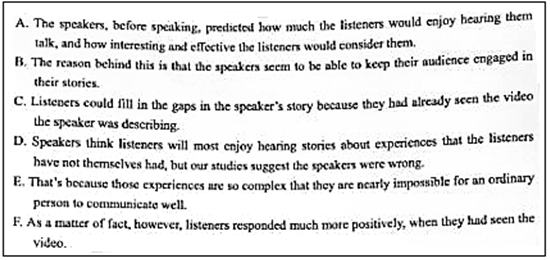��Ŀ����
13���ٶ�Ӣ�������ʦҪ��ͬ��֮�佻�������ģ���������ͬ��д���������ģ����й���10�����Դ���ÿ���������������ÿ��������漰һ�����ʵ����ӡ�ɾ�����ģ����ӣ���ȱ�ʴ���һ��©�ַ��ţ��ģ�������������д���üӵĴʣ�
ɾ�����Ѷ���Ĵ���б�ߣ�\��������
�ģ��ڴ��Ĵ��»�һ���ߣ����ڸô�����д���ĺ�Ĵʣ�
ע�⣺1��ÿ���������ľ�����һ�ʣ�
2��ֻ������l0�������ߣ��ӵ�11���𣩲��Ʒ֣�
As a teenager��that is important to give your body the energy it needs��Have meals��and you won't get enough energy and then you will feel tired��You should ate rice��bread��fruit and vegetables��You also need to drink a lot of water��that will improve your skin and give you healthy hair��
Exercise is other way of keeping fit��Take exercise at least 30minutes a day is easy!Walking and riding bikes counts��and so do school sports��When you exercise��your body produces some chemicals to make you feel peaceful and relaxing and increase your ability to concentrate on��
Enough sleep is also important for your health��It can help prepare you for day to come��
���� ��Ϊ�����꣬���������������Ҫ���㹻�����Ǻ���Ҫ�ģ�������Է�����Ͳ��ܵõ��㹻����������˾ͻ�е�ƣ�룮������ˮ��������Ƥ��������ӵ�н�����ͷ���� �����ܹ��������彡����ÿ����֤��ֵ�˯�߶���Ľ���Ҳ�Ǻ���Ҫ�ģ�
��� As a teenager��that is important to give your body the energy it needs��Have meals��and you won't get enough energy and then you will feel tired��You should ate rice��bread��fruit and vegetables��You also need to drink a lot of water��that will improve your skin and give you healthy hair��
Exercise is other way of keeping fit��Take exercise at least 30minutes a day is easy!Walking and riding bikes counts��and so do school sports��When you exercise��your body produces some chemicals to make you feel peaceful and relaxing and increase your ability to concentrate on��
Enough sleep is also important for your health��It can help prepare you for��day to come��
��⣺
1��that��Ϊit ����it�÷���it����ʽ��������������Ƕ��ʲ���ʽ���� to give your body the energy it needs��
2��and��Ϊor �������ʣ�"��ʹ��+or+��"��һ�־��ͣ���ʾ"�������ô���ᷢ��ʲô����"��һ�㷭���"����"��
3��ate��Ϊeat ������ӽṹ��should��Ӷ���ԭ�Σ�
4��that��Ϊwhich ���鶨��Ӿ䣮�������ӽṹ��֪����һ������Ӿ䣬���д���ǰ���������ӣ��ڴӾ���������ù�ϵ����which��that�������ڷ������Զ���Ӿ��У�
5��other��Ϊaother ��������÷���other��Ϊ"������"��another��Ϊ"���ˣ������ģ���ͬ��"���˴�Ӧ�Ǻ��ߣ�
6��Take��ΪTaking ���鶯���ʣ��������ӽṹ������ȱ������ö����ʶ���Taking exercise at least 30minutes a day �����
7��counts��Ϊcount ������νһ�£�����Walking and riding bikes��ʾ�������ν�ﶯ��ҲӦ�ø�����ʽ��
8��relaxing��Ϊrelaxed �����ȥ�ִʣ��˴��ù�ȥ�ִ�relaxed�������ȥ�ִ���������������ʾ��������������״̬����б仯�������������ˣ�
9��ȥ��on ��������÷���concentrate on�Ǽ��ﶯ�ʶ����ȱ�ٱ��Ҫȥ��on��
10����the ����ڴʣ�day���в���ʽto come�����ö���Ӷ��ڴ�the��ʾ��ָ��
���� �߿����ĸĴ������ʽ��˵���ģ����Ĺ��£����ŵȣ����к�ǿ��ʵ���ԣ����ĵ����ݺ����Զ����ϸ���ѧ����ʵ�ʣ��ӱ����Ͽ�����һƪѧ��ϰ�������ȣ�ͨ��ȫ�ģ��˽���Ĵ��⣬����ȫƪ��ʱ̬���˳Ƽ�����������ͨ��ȫ��ʱ��һЩ���Ĵ����ȸĺã��ٽ������Ĵ�����Σ�Ҫ����������ӵĸĴ�������Ҫ�����еĴʷ����䷨����ƪ���ط������ر�ע�⣮���ѸĺõĶ������Ķ�һ�飬�����Ƿ���ȷ���о��Ƿ��в���֮���������γɶ��壮

| A�� | neither do I | B�� | I don't��either | C�� | neither I do | D�� | nor will I |
| A�� | give out | B�� | work out | C�� | get out | D�� | stand out |
14��The government took effective measures ______ when the deadly virus approached��
15��Absolutely��______ should we give in to people who behave against public morals����������
| A�� | at a time | B�� | in no time | C�� | at times | D�� | at no time |
Waiting for the airplane to take off��I was happy to get a seat by myself��Just then��an air hostess approached me and asked��"Would you mind ��36��B your seat��A couple would like to sit together��"The only ��37��B seat was next to a girl with her arms in casts ��ʯ���������a black-and-blue face��and a sad expression��"��38��A am I going to sit there��"I thought immediately��But a soft voice spoke��"She needs help��"Finally��I ��39��A to move to that seat��
The girl was named Kathy��She ��40��C in a car accident and now was on her way for��41��D��
When the snack and juice arrived��it did not take me long to ��42��D that Kathy would not be able to ��43��C herself��I considered ��44��C to feed her but hesitated��as it seemed too ��45��B to offer a service to a ��46��A��But then I realized that Kathy's need was more��47��C than my discomfort��I offered to help her eat��and��48��A she was uncomfortable to accept��she ��49��C as I expected��We became closer and closer in a short period of time��By the end of the five-hour trip��my heart ��50��D��and the��51��B was really better spent than if I had just sat by myself��
I was very glad I had reached ��52��D my comfort zone to sit next to Kathy and feed her��Love ��53��Bflows beyond human borders and removes the fears that keep us ��54��D��When we stretch to serve ��55��A��we grow to live in a larger and more rewarding world��
| 36��A��losing | B��changing | C��taking | D��giving |
| 37��A��comfortable | B��available | C��suitable | D��favorable |
| 38��A��No way | B��No problem | C��Nowhere | D��No doubt |
| 39��A��decided | B��wanted | C��regretted | D��promised |
| 40��A��was | B��would be | C��had been | D��used to be |
| 41��A��business | B��travel | C��pleasure | D��treatment |
| 42��A��know | B��say | C��recognize | D��realize |
| 43��A��eat | B��choose | C��feed | D��support |
| 44��A��stopping | B��needing | C��offering | D��trying |
| 45��A��far | B��impolite | C��close | D��fast |
| 46��A��stranger | B��neighbor | C��passenger | D��girl |
| 47��A��unusual | B��direct | C��important | D��shameful |
| 48��A��although | B��when | C��since | D��as |
| 49��A��refused | B��wondered | C��did | D��cried |
| 50��A��had cheered | B��had jumped | C��had broken | D��had warmed |
| 51��A��life | B��time | C��money | D��energy |
| 52��A��below | B��through | C��across | D��beyond |
| 53��A��seldom | B��sometimes | C��hardly | D��never |
| 54��A��unhappy | B��independent | C��silent | D��separate |
| 55��A��another | B��ones | C��other | D��the other |
